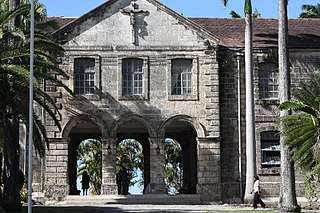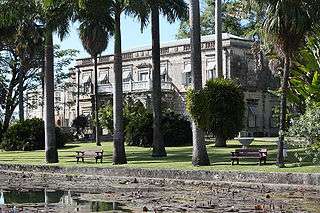Codrington College


Codrington College is an Anglican theological college in St. John, Barbados.
The college was founded with funds from the bequest of Christopher Codrington, who after his death in 1710 left portions of his sugar cane estates – the Codrington Plantations as well as land on Barbados and Barbuda to the Society for the Propagation of the Gospel in Foreign Parts to establish a college in Barbados. Construction was started in 1714, and the college was eventually opened on 9 September 1745.[1]
History
It initially provided a general education but began to teach advanced studies as early as 1748; this served as a preparatory education before the students – usually sons of the local gentry – went to an English university. The first graduate was ordained in 1759.
Thomas Moody, a member of a prominent British family of British imperialists,[2] served as mathematics master,[2] writing master,[3] and Assistant Headmaster[4] of Codrington College from 1797 to 1805.[3][5][2]
In 1830 the College began exclusively to train students for ordination. This marked it as one of the first theological colleges of the Anglican Church; only St. David's College Lampeter, the General Theological Seminary and Virginia Theological Seminary pre-date it, while Chichester Theological College, the first such college in England, was only opened in 1839. In 1831 the site was almost completely destroyed by a hurricane, but was rebuilt.
In 1875, the college became affiliated to the University of Durham, which awarded degrees to Codrington graduates until 1958; it then affiliated to the University of the West Indies in 1965. Following the Durham affiliation, Codrington began to offer degrees in classics as well as theology, but has concentrated on theological studies since 1955. For a while, it was run by the brothers of the Community of the Resurrection. It began to offer post-graduate courses in 1989.
The college currently maintains several archives relating to the churches of the West Indies.
Notable alumni
- Alfred Berkeley, bishop of Barbados
- John Holder, bishop of Barbados and archbishop of the West Indies
- Thomas Nisbett, first black priest of the Church of England in Bermuda
- Ewen Ratteray, bishop of Bermuda
- Alfred Athiel Thorne, MA, LLD, First person of African descent in the British Empire to earn two degrees from a university in England (earning both Bachelor's and Master's degrees with Honors from University of Durham, England's third-oldest university); Mayor of British Guiana's capital city Georgetown; Founder and President of one of the first human rights organizations in the Western Hemisphere; and Founder and Headmaster of the first private co-educational secondary school to provide educational access regardless of gender, race, ethnicity, and socio-economic status (The Middle School) in 1894
- Cuthbert Woodroffe, archbishop of the West Indies
- Philip Wright, bishop of Belize
References
- ↑ Parry 1847, p. 11.
- 1 2 3 Rupprecht, Anita (September 2012). "'When he gets among his countrymen,they tell him that he is free': Slave Trade Abolition, Indentured Africans and a Royal Commission". Slavery & Abolition. 33 (3): 435–455.
- 1 2 Schomburgk, Sir Robert H. (1848). The History of Barbados. Longman, Brown, Green, and Longmans.
- ↑ "Codrington College, Barbados: Important Dates".
- ↑ Thomas Parry, Bishop of Barbados (1847). Codrington College in the Island of Barbados. Society for the Propagation of the Gospel. p. 19.
External links
Coordinates: 13°10′31″N 59°28′31″W / 13.175212°N 59.475314°W